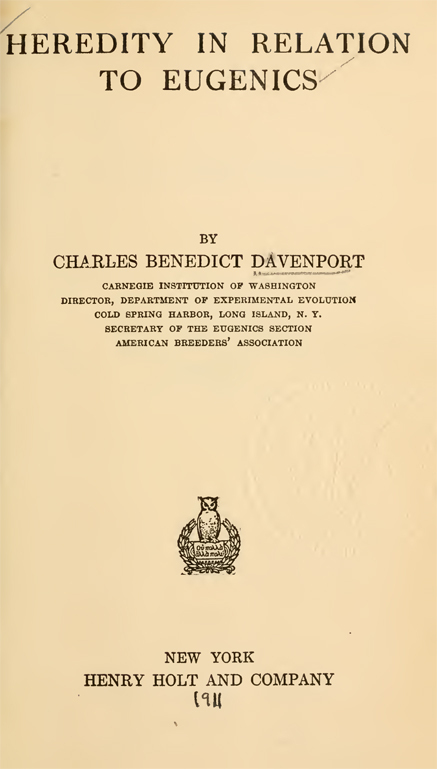Charles B. Davenport
The eugenics movement in the United States had a fairly consistent core group of leaders up through the 1930s, including Harry H. Laughlin, Henry F. Osborn, David Starr Jordan, and Madison Grant, and, one of the foremost, Charles B. Davenport. Charles Benedict Davenport (1866-1944) was Harvard-educated and an instructor in the Department of Zoology until 1899 when he joined the faculty of the University of Chicago. In 1902, the Carnegie Institution of Washington was incorporated, and Davenport campaigned actively to establish a biological experiment station, and, in 1904, he was appointed director of the Station for Experimental Evolution at Cold Spring Harbor on Long Island. There, he worked on applying Mendelian genetics concepts to man.
Davenport, who defined eugenics as “the science of the improvement of the human race by better breeding,” turned the station into a research center into human genetics and eugenics and, with the monetary assistance of Mary Harriman, the widow of a Wall Street financier, he purchased land at Cold Spring Harbor and, in October 1910, opened the Eugenics Record Office. It quickly became a center for the movement in the United States. The Office began an ambitious program of both research and propaganda, educating field workers in eugenic theories, providing public lectures and education, publications, genetic counseling in marriage, and the compilation and collection of detailed family histories to illustrate the nature and possible dangers of inherited tendencies. Eugenic theories were beginning to be used to address social problems, for if undesirable or criminal tendencies and traits were inherited, elimination of the inheritance by education or sterilization would alleviate the problem. Eugenicists embraced the idea of alleviating society of the burden of care of those deemed unfit. Conversely, individuals with positive or desirable traits—intellectual or physical—would be encouraged to marry those with similar endowments to thereby enhance the human race.
In 1917, Mrs. Harriman donated the Eugenics Record Office to the Carnegie, along with an annual appropriation of $12,000 to ensure the continuance of eugenic research. At that date, The New York Times reported of the Office: “There are over 100 persons employed and investigations have been conducted in every State of the Union…. A large number of prison inmates have been examined, also the insane and feeble-minded and other persons under State care. The effects of the marriage of defective persons as lowering the standards of the race and burdening the State with the care of criminals, insane and other helpless individuals have been studied.”
Davenport’s book, Heredity in relation to eugenics, with its emphasis on the study of inherited traits and dispositions to disease, is dedicated to Mrs. Harriman “in recognition of the generous assistance she has given to research.” This particular copy was presented to the American Social Hygiene Association by John D. Rockefeller, Jr., in 1930.

